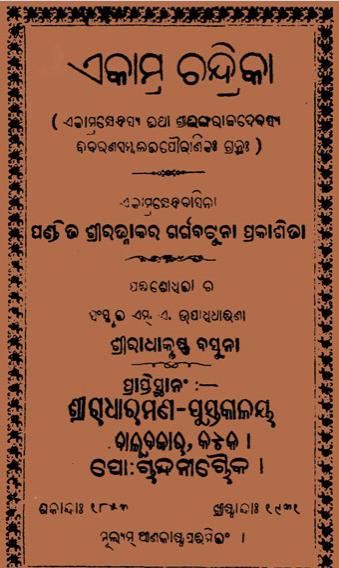In the vibrant landscape of Odia literature, few works resonate as deeply with readers as Ekamra Chandrika, a poetic collaboration by Ratnakara Gargabatu and Radha Krusna Basu, published in 1931. This remarkable collection brings together the lyrical finesse and cultural richness of Odia poetry, celebrating the beauty of nature, human emotions, and the intricate tapestry of life experiences.
The title Ekamra Chandrika, which translates to Moonlight of Ekamra, refers to the enchanting beauty of the natural world, particularly the sacred city of Bhubaneswar, often referred to as Ekamra Kshetra. The moonlight symbolizes both illumination and tranquility, creating a perfect metaphor for the poetic exploration within the text. The collaborative effort between Gargabatu and Basu emphasizes not only their individual talents but also a shared vision of portraying the essence of their cultural identity through poetry.
At the heart of Ekamra Chandrika lies an unwavering appreciation for nature. The poets masterfully depict the landscapes of Odisha, infusing their verses with vivid imagery that brings to life the sights, sounds, and scents of the environment. From the lush greenery that adorns the region to the serene rivers and the majestic temples, the poetry encapsulates the essence of Odisha’s natural beauty. Such rich descriptions invite readers to immerse themselves in the scenery, creating an emotional connection with the land that feels both personal and universal.
Beyond nature, the poems in Ekamra Chandrika delve into the realms of love and longing, capturing the complexities of human relationships. The poets draw upon their own experiences and emotions to present a tapestry of feelings—joy, sorrow, hope, and yearning— that resonate with readers across generations. The lyrical quality of the verses enhances the emotional depth, allowing readers to feel the passion and pain expressed within each line. This exploration of love is not limited to romantic pursuits but extends to friendships, family bonds, and the inherent longing for connection that defines the human experience.
The collaboration between Gargabatu and Basu also highlights a significant aspect of Odia poetry: the integration of folklore and cultural references. Their verses reflect the rich heritage of Odisha, incorporating traditional stories, myths, and local customs. By doing so, Ekamra Chandrika serves as a cultural artifact that not only preserves these stories but also makes them accessible to contemporary readers. It fosters a sense of pride in Odia identity and encourages a deeper understanding of the region’s history and culture.
Furthermore, the poetic style of Ekamra Chandrika is characterized by its musicality, with carefully crafted rhythms and cadences that enhance the reading experience. This musical quality allows for a lyrical flow that makes the poems memorable and engaging. The use of various poetic forms and structures showcases the versatility of the authors and their commitment to artistic expression.
Books Info
| Books name | Ekamra Chandrika / ଏକାମ୍ର ଚନ୍ଦ୍ରିକା |
| Author | Ratnakara Gargabatu; Radha Krusna Basu |
| No Of pages | 136 |
| Publisher | NA |
| Publication | 1931 |
| Printed At | NA |
| Distributor | NA |

